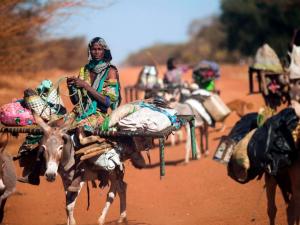
Sudan and South Sudan agree on how to draw Abyei border
Sudan and South Sudan are finally on the way to reaching an agreement on the final status of Abyei, the disputed oil-rich region on the border between the two countries.
A week-long meeting by two committees in Khartoum last week came up with an interim report that will form the basis of the final status of Abyei, a region that has remained undetermined for 17 years since the signing of the 2005 Comprehensive Peace Agreement.
The committees led by Sudan’s Sovereign Council, Mohammed Hamdan Dagalo, and South Sudan’s security advisor, Tut Gatluak Manime, agreed on seven areas that will determine the issue Abyei, whose uncertain status resulted in years of conflict between the Ngok Dinka of South Sudan and Misseriya of Sudan.
According to Dafallah Al Hajj Ali, the Undersecretary in Sudan’s Ministry of Foreign Affairs, the two sides will initially provide citizen services to the people, form a team to provide humanitarian aid and work on a long-term solution through dialogue.
Previous agreements
The committees agreed to determine the status of Abyei based on the two previous agreements — the 2005 Abyei Protocol and the 2009 ruling by the Permanent Court of Arbitration in The Hague.
The Abyei Protocol — commonly known as the Machakos Protocol — the residents of the Abyei have been declared, on an interim basis, to be simultaneously citizens of Sudan’s West Kordofan State and South Sudan’s Northern Bahr el-Ghazal State until Abyei’s permanent status is determined vide referendum.
The disputed Abyei region was supposed to hold a simultaneous referendum with South Sudan in January 2011 to decide whether they want to belong to Sudan or South Sudan, but, South Sudan and Sudan have failed to reach an agreement on who can vote in the referendum.
Misseriya pastoralists
Khartoum had demanded the participation of the Misseriya pastoralists who come to the north of Abyei to graze their herds and for water in River Kiir during the dry seasons, but Juba had objected arguing that the Misseriya who belong to Sudan are not permanent residents of the region.
A member of the Abyei Intellectuals, Dr Luka Biong, said that the final solution to the disputed area depends primarily on the previous references and agreements and any other new mechanisms will not work.
The 2009 PCA ruling, on the other hand, ceded 10,000 square km including key oilfields of Heglig and Bamboo to Sudan. Khartoum had maintained ownership of these areas that had been transferred to South Sudan by the 2005 peace agreement.
Improve security
They also agreed to initiate dialogue between the Ngok Dinka and the Misseriya to foster peace and reconciliation and improve security.
The Ngok Dinka has been under attack from the Misseriya in the north, and the Twic from Warrap State in the South — in a historical conflict that’s over 50 years.
The conflict between the Ngok Dinka and Misseriya started way back in 1905 when the British transferred the region from Bahr-al-Ghazal Province in southern Sudan to Kordofan Province in the North. Over the years, these two communities have been fighting over land and pasture claimed by both communities.
According to Akol Miyen Kuol, the author of Sudan: Understanding the Oli-Rich Region of Abyei, there is a need to put more pressure on Sudan and South Sudan because they must come up with the final status of Abyei once and for all.
“The Nine Ngok Dinka Chieftains of Abyei, mainly, should continue putting pressure on the two countries as they cannot wait indefinitely for the final status of their region,” said Mr Kuol.
Referendum
However, the two committees failed to discuss the issue of the referendum, which is fundamental in the final status of Abyei because it will give the area residents the chance to decide whether they want to belong to South Sudan or Sudan.
Frustrated by the delay in settling the status of Abyei, the Ngok Dinka in 2013 unilaterally decided to hold their own referendum in which the Abyei residents voted 90 percent have Abyei to join South Sudan. However, the African Union, Juba, and Khartoum refused to recognise the results since it was done outside the 2005 peace agreement.
In 2011 when Abyei failed to hold the referendum, the United Nations established the Interim Security Force for Abyei (UNISFA) to check against violence and escalating tensions. The UNISFA is authorised to use force in protecting civilians and humanitarian workers in Abyei.
https://www.theeastafrican.co.ke/tea/news/rest-of-africa/juba-khartoum-a...
